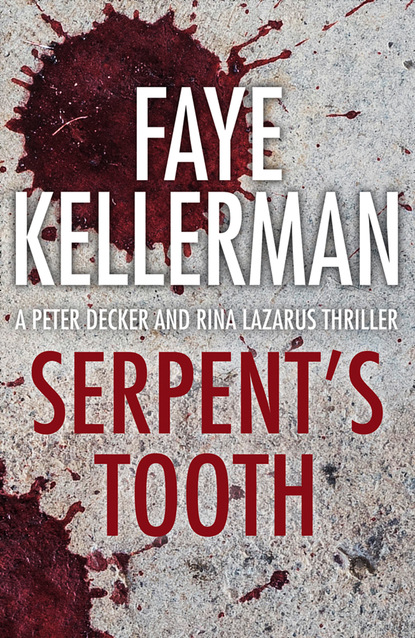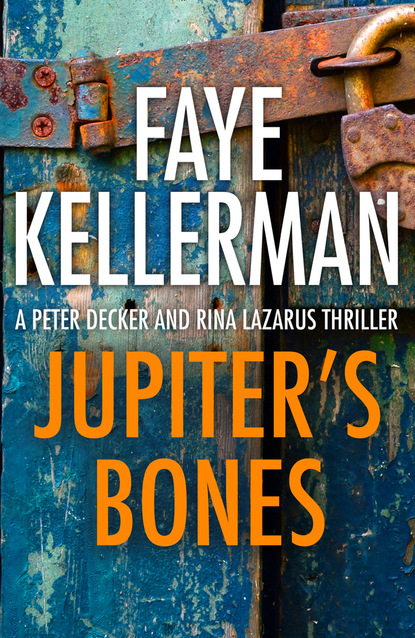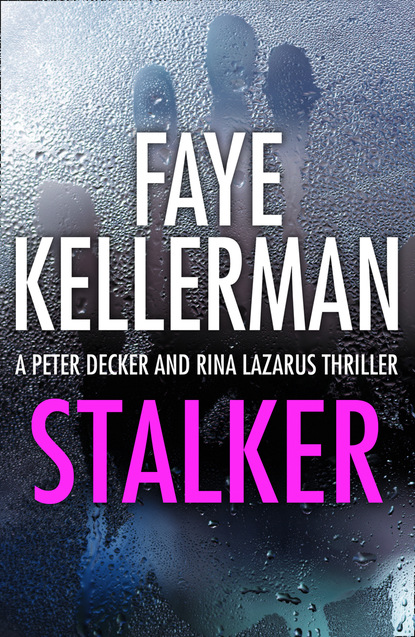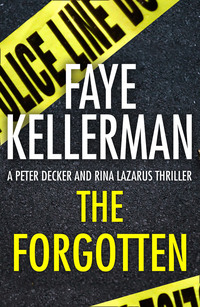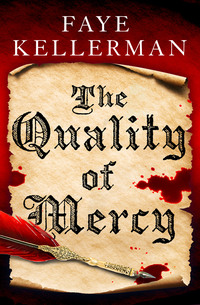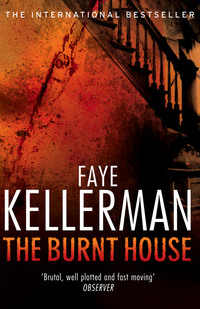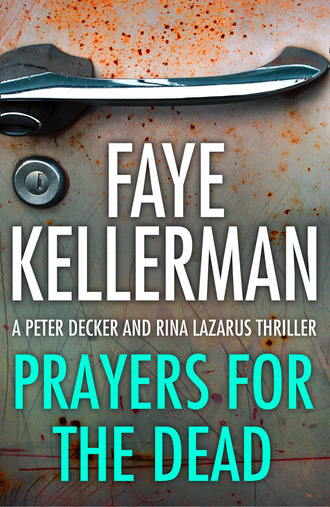
Полная версия
Prayers for the Dead
“Is she still at the hospital?”
“I don’t know where Scotty talked to her. On the phone or at the hospital.”
“So the great man was last seen about eight.” Craine snapped up his black bag. “It’s now quarter to eleven. You have an accurate time frame. Better than the one that science could have provided.”
“Did you know him, Jay?”
“I knew of him, Lieutenant. Everyone knew about Dr. Sparks.” Craine turned away. “This is very difficult. Seeing such a man as he … butchered like this.”
“Tell me about the murder.”
“Shots to the head and neck. Severed his brain stem. Most likely that was the primary cause of death. The other savagery … the chest wounds. I’d say they were postmortem. Someone was very strong and very angry. To crack the sternum and rib cage and expose his heart. A long knife with a big blade. I found some pulverized bone matter. Anything might have been used to smash the chest cavity. A crowbar, a baseball bat. A hammer or a mallet.”
“Things easily found in any car or toolbox or kitchen,” Decker said.
“Yes,” Craine agreed. “Whoever did this was a strong person.”
“Male, then.”
“I would think. Even a strong woman … to do this much damage …” Craine furrowed his brow in concentration. “If I were you, I’d be looking for someone with a penis.”
Gaynor held back a smile. “Smashing up the chest and exposing the heart. Sounds like someone was making a statement.”
“Indubitably.” Craine took off his gloves. “We’ll take him to the morgue now. Autopsy will be done first thing tomorrow.”
Decker said, “I have one of Dr. Sparks’s sons in the car. He’s come down to make the ID.”
“It’s Azor,” Craine said. “I’ll state it formally, if you’d like. Save the man some agony.”
“I think he knows it’s his father. I think he just wants to see it for himself.”
“Good gracious why?”
“He’s a priest,” Gaynor said. “Maybe he wants to perform last rites on him.”
“Can you do last rites on someone who’s deceased?” Decker asked. “Besides Azor Sparks wasn’t Catholic.”
“He was very religious,” Craine said. “Everyone knew about Azor Sparks, his Fundamentalist beliefs, and his commitment to God.” The ME paused. “Perhaps he did have a hot line to the Supreme Being. He certainly saved a lot of lives.”
Decker said, “I’ll bring the priest over as soon as your men put him in the bag and on the stretcher. I don’t want him to see the crime scene.”
“Very considerate of you, Lieutenants,” Craine muttered. “Very considerate. Copious amounts of spatter. The image is haunting even for the most professional of us. Good night.”
Gaynor watched as Craine got into his car and drove away. “He seemed upset. Well, maybe not upset. More like … affected.”
“Aren’t we all.” Decker shook his head. “Where’re Webster and Martinez?”
“On Dumpster patrol.” Gaynor pointed into the darkness. “See those blips of light?”
“I don’t see anything.”
“Good thing about getting old,” Gaynor said. “You become very farsighted. I see the flashlights. Maybe they’re about a block and a half, two blocks down. Want me to get them on the walkie-talkie?”
Decker peered down the empty space, trying to make out light. “No, I’ll talk to them later. Let me get the identification over with.” He turned his eyes back to the scene. They had loaded Sparks onto a stretcher. “Clear the decks for me, Farrell. Give the son some breathing room.”
Decker walked back to the Volare, opened the passenger door. Bram got out, balancing his weight on the car before he stood up.
“You need help?”
“No.”
“Over here.” Decker led the priest to the stretcher, the body encased in a vinyl bag. He nodded to an attendant who unzipped a portion of the plastic sheath.
The priest glanced downward, quickly averted his eyes, then stepped backward. “Dear God!”
Decker peeked. Dead eyes stared upward at the foggy moon. He took the priest’s arm, but Bram shook him off.
“I’m all right.” He covered his mouth, then let his hands drop. “I’m all right. I want to see him again.”
Decker stared at him.
“Please,” Bram said quietly. “Please, I need to see him again. Have them unzip the bag.”
Decker nodded to the attendants. Again, they opened the vinyl casket. The priest came forward, forced his eyes downward. Without warning, he dropped to his knees and crossed himself. Closed his eyes and clasped his hands. He brought his fists to his forehead and prayed, his mouth incanting a slurry of what sounded like Latin. Decker crooked his finger, beckoning the lab men away from the stretcher.
Give the man his illusion of privacy.

The last registered event in Dr. Azor Sparks’s daily calendar was an in-house dinner meeting with three people: Reg, Myron, and Liz. It took only a quick call to Sparks’s secretary—Heather Manley—for Oliver to find out that Reg was Dr. Reginald Decameron, Myron was Dr. Myron Berger, and Liz was Dr. Elizabeth Fulton. This entry was one of many that had appeared in Sparks’s business book—a semiweekly research meeting of some sort, according to the secretary, Heather. And the dinner meetings were always held in Sparks’s conference room, not at Tracadero’s. That was all he could glean before Heather’s hysteria broke through.
Oliver’s eyes moved off the pages of Sparks’s daily planner and scanned the office. Place was twice as big as his apartment. A hell of a lot nicer, too. Wood-paneled walls, plush hunter green carpeting, surround-sound stereo speakers, wet bar, and fridge—all this plus a canyon view of the nearby mountains. True, there was no booze in the bar, only fruit juices, but that could be remedied. He cast his gaze on the ceiling-mounted television set. To Marge, he said, “Maybe we should turn on the TV.”
Marge shut Sparks’s top desk drawer. Nothing of substance in it. She tried the file drawers in his walnut desk, then the ones in his credenza. Locked, of course. “Think you’re outta luck, Scotty. He probably doesn’t subscribe to Adam and Eve.”
“How kind of you to sum me up as a horndog.” Oliver began putting stickums on Sparks’s planner. “I just wanted to see if the murder hit the networks yet. Because as soon as it gets out, hospital’s going to be thrown into a panic. Just like his secretary. Where the hell is she? She said she only lives fifteen minutes away. It’s not exactly rush hour.”
Marge investigated a wall of built-in bookshelves, her finger moving over the spines of thick medical tomes. “Didn’t she say she was going to call up his coworkers?”
“Three doctors. How long does it take to call up three doctors?”
Marge shrugged. “Sure, turn on the set.”
Oliver stretched and flipped the power on the ceiling-mounted TV. The monitor filled with a dark image—the climax of some series cop show. He watched an actress in a police uniform chase a bad guy, her breasts jiggling and heaving as she followed him to an alley. Her pants were skintight, showed off a well-formed ass as she peeked around a garbage can. Oliver’s eyes crept over to Marge. She was dressed in a baggy pantsuit and had gunboats on her feet.
“See anything interesting in his book?” Marge asked.
“Nothing that means anything to me.” Oliver paged through his notes. “Patient names, procedures, surgeries, staff meetings, reminders for birthdays and anniversaries … quite a few of those. Maybe he owned stock in a greeting card company.”
Marge glanced at the wood paneling. Interspersed with numerous diplomas and certificates were family photographs. “Looks like Sparks had lots of children and grandchildren. What a shame!”
Zing went the bullet against the trash can on TV. The heavy-breasted actress jumped back. Her makeup was still perfect, not a drop of sweat sullied her brow. Man, if that had been him, he’d be browning his jockeys. Oliver said, “Sparks had lots of meetings with various companies.”
“Which ones.”
“Biolab, Meditech, Genident, Bloodcell, Armadonics, Fisher/Tyne—that name came up on a regular basis. About once a month. Isn’t that a drug company?”
“Yeah.” Marge scratched her head. “My God, he was a busy bee. Wrote two medical textbooks, coauthored another four, and was an editor of a dozen others. Where did he find time to do all this?”
Oliver’s eyes went back to the TV. The big-boobed cop was now draped in a filmy nightie. She lay in bed, nestled in the arms of a stud with a deep voice and a cleft chin. As she talked, Mr. Cleft looked at the babe with the expression “Jesus, I’m an earnest guy” stamped across his puss. Okay, so he wasn’t humping her bones. Which would have been the real picture if this was real life. Okay. So maybe they had just humped, and he was older and had a long refractory period. Oliver could maybe buy that. What he couldn’t buy was the fact that he was listening to her. In real life, the guy would be completely zoned out, thinking about tax dodges or rotary baseball.
Marge checked her watch. “Manley does seem to be taking her time.”
“Lucky the janitor had a key,” Oliver said. “What’d you think about her reaction to the news?”
“After I got my hearing back?”
“Yeah, I could hear her scream across the room. Most people, upon hearing news that their boss was popped, are stunned. They don’t say anything.”
“Heather’s obviously the hysterical type.”
“All women are the hysterical type,” Oliver pronounced. “But Manley letting go with a wallop like that … weird. My head’s still ringing.”
Marge smiled, continued going over the books in Sparks’s shelves. “Heather reacted as if she was more to Sparks than just a secretary.”
“I have no trouble believing that,” Oliver said. “According to his daily calendar, he spent most of his waking hours at the hospital. And Heather is a nice piece of pie.”
“How do you know what she looks like?”
“Pictures on her desk.”
“She keeps pictures of herself on her desk?”
“Nah, pictures of her and some guy. But you know how it is. Secretaries and their bosses. Especially someone like Sparks. Power is the ultimate lady-killer. How else do you explain ugly, old guys getting laid by nymphets?”
“Well, if Sparks was boffing her, he’s your typical religious fanatic hypocrite.”
“Don’t let Decker hear you say that.” Oliver paused. “Why do you say that?”
“Because he’s got three bookshelves filled with religious material—Christian newspapers and magazines, lots of prayerbooks and numerous Bibles.” Marge shrugged. “Maybe Sparks and Heather read Bible together.”
Oliver laughed. “Well, I have no trouble believing that sweet Heather was on her knees.”
The door pushed open. A female voice screaming, “Just what do you think you’re doing!”
Marge brought her index finger to her right ear and rubbed it against the skinflap. Oliver held out ID.
The young woman was in her late twenties with big, big hair. Lots of it spilling down her shoulders and back. She was slim, wore a red knit dress that showed off curves. She whacked Oliver’s shield away. “I don’t care who you are. You have no right to invade my boss’s privacy!”
The news came on the TV. Sure enough, Sparks’s death had made the headlines. The young woman burst into a crescendo of wails. “I can’t believe it. I can’t believe it!”
“Ms. Manley,” Oliver said tentatively, “why don’t you sit down.”
She pulled on her overteased tresses, her saucer eyes spilling tears as she yanked. “Who would hurt the doctor? He was the gentlest person on the face of the earth! Why would anyone hurt him?”
“Ms. Manley, why don’t you sit down.” Marge mouthed to Oliver, “Turn the damn thing off!”
Oliver cut off the newscaster midsentence. Heather was still moaning. He said, “Why don’t you sit, Ms. Manley?”
She continued to pace.
Oliver said, “Sit down, ma’am … as in sit down in a chair.”
The secretary stopped treading, stared at Oliver. He pulled out the chair. “Please?”
She sat, the hem of her dress resting mid-thigh over smooth, white legs. Oliver did a rapid once-over, then said, “We need your help, ma’am. Did you get hold of any of the doctors that were at Sparks’s six o’clock meeting?”
Heather sniffed loudly. “Dr. Decameron said he’s on his way over here. Dr. Fulton … she can’t come down because she can’t get a baby-sitter. And her husband isn’t home yet. The dirty rat is never home. He’s a real jerk, suffers from a Peter Pan complex.”
Marge took out her notepad. “Now this Dr. Fulton is one of Dr. Sparks’s co-workers?”
“Yes.” Heather pulled a Kleenex out of her purse, blew her nose, and dried her eyes. “She works with Dr. Sparks on Curedon. They all do.”
“Who’s all?” Oliver was having trouble following Heather’s train of thought.
“Dr. Decameron, Dr. Fulton, and Dr. Berger. They work with Dr. Sparks, testing his drug, Curedon.”
Oliver perked up. “Dr. Sparks discovered a new drug?”
“He didn’t discover a drug,” Heather corrected. “He developed one. After years of research in his laboratory. Curedon is an antirejection drug. Fisher/Tyne bought it.”
“What do you mean bought it?” Marge asked.
Heather sighed. “I’m not sure. You’ll have to ask Dr. Decameron and hope for the best.”
“Hope for the best?” Oliver asked.
“Reggie is a jerk. Try getting any answers out of him. I don’t know why Dr. Sparks puts up with him.” Heather wiped her eyes again. “Actually, I do know why. The doctor was the best boss I’ve ever had. The most honest, sincere, nicest, gentlemanly … not that he didn’t have his moments. But once you understood his genius …” She exploded into a new wave of sobs.
“How long had you worked for him, Ms. Manley?” Oliver asked.
“Five years,” she cried.
“You were close to him?” asked Marge.
“I loved him!” she wailed.
Marge and Oliver exchanged glances. Heather caught it. “Not in the way you think. I loved him as in ‘hopelessly in love’ with him. He never laid a finger on me.”
Maybe not a finger, Oliver thought.
Heather said, “He was a gentleman in every way. Completely devoted to his wife and family. He wouldn’t ever think of touching another woman, much less have an affair. He was deeply religious.”
Again, Marge and Oliver looked at each other. Oliver said, “You sound like you’re pretty sure about that.”
“I’m positive!”
“You know, Heather, if you’re trying to lead us down the wrong path—”
“I’m not—”
“I’m not saying you are,” Oliver said. “All I’m saying is that if something was kinky with Sparks, it’s going to come out.”
“Nothing … and I mean nothing … was ever kinky with Dr. Sparks! The only thing he ever got into trouble for was being too good.”
“How’s that?” Marge asked.
“Like I said, he was deeply religious. He had tremendous faith in God and didn’t understand those who didn’t—”
“Oh please, Heather, spare them the Jesus on the cross routine.” A forty-plus man stuck out his hand to Marge. “Reginald Decameron. This is just horrible! It’s already made the news! I heard it coming over. Someone want to tell me what’s going on?”
Marge regarded the doctor. Slender, well-coiffed, well-dressed. Thin features, piercing dark eyes. Self-assured to the point of haughtiness. He wore white shirt, gray slacks, and a blue cashmere blazer. Pocket handkerchief in the blazer, silk hand-painted jacquard tie around his neck. She took the proffered hand. “Thank you for coming down.”
“How could I not come down.” He turned to Heather. “Where are Dr. Berger and Dr. Fulton?”
“They can’t make it—”
“What?” Decameron was outraged. “Azor is … murdered, and they can’t see fit to talk to the police?”
“Dr. Fulton couldn’t get a baby-sitter, Dr. Decameron. Her husband wasn’t home when I called.”
“And what was Myron’s excuse?” Decameron raised his brow. “Bad hair day?”
Heather glared at him. “How can you be so awful at a time like this?”
“What better time,” Decameron snapped back. He hugged himself, looked Oliver up and down. “This is truly horrid. What in the world happened?”
Oliver squirmed under Decameron’s intense but rapid scrutiny. Overt, sexual overtones. The man was gay. “That’s what we’re trying to figure out, Dr. Decameron.”
Marge stepped in. “As we understand it, Dr. Decameron, you, Dr. Berger and Dr. Fulton last saw Dr. Sparks at a dinner meeting.”
“Yes, one of our weekly staff get-togethers. Started around six, ended around eight.”
“Anything unusual happen at the meeting?”
It was Decameron’s turn to squirm. “Well, I might as well fess up. Myron’s going to jump at the opportunity to tell you this. It might as well come from me.”
The room fell silent.
“Azor was miffed at me,” Decameron admitted.
“What happened?” Oliver asked.
“Well, our research meetings are ostensibly an open forum to exchange ideas. Sometimes I get a little aggressive in my opinions offending our great Grand Imperial Wizard.”
“That’s not what I heard,” Heather piped in.
“I’m getting to that, child. Hold your hair, for goodness sakes.” Decameron turned to Marge. “Azor became miffed at me. I peeked at some of the great doctor’s data on his fax machine before he had a chance to see it. Not a terrible thing. But not courteous, either.” He paused. “Azor was angry. After the meeting … after Myron and Liz had left … I smoothed things over with him. Of course, they weren’t around to witness it. But I am telling you the truth.”
“What time was this, Dr. Decameron?”
“A little before eight. I remember it distinctly because we ended earlier than usual. Azor had received a call from one of his sons and cut the meeting short.”
“Okay.” Marge wrote furiously. “Does this son have a name?”
“Paul.”
“Was Dr. Sparks planning to meet Paul somewhere?”
“I haven’t the faintest idea. His sons call often. They’re always hitting him up for money.”
“That’s ridiculous,” Heather interjected.
Decameron paused. “Okay. Paul and Luke are always hitting him up for money. True or false?”
Heather snapped her lips together, folded her arms across her chest.
“How many sons does Dr. Sparks have?” Oliver asked.
“Four,” Decameron said. “The youngest one, Michael, he’s what we call a legacy med student. Someone who gets in because of … connections. I call them capons.”
“Michael’s not bright?” Oliver asked.
“Neon, he’s not,” Decameron replied. “But he is young. He could season if he’d cut the strings. He still lives at home, so the little snot gets whatever he wants—”
“You don’t like his kids, do you?” Oliver said.
“I don’t like anyone, so don’t go by me.” Decameron sighed. “No, I don’t like his children. They’re all suck-ups. Except the priest. He’s independent so far as I can tell. And a good man.”
“Who’s he?” Oliver asked.
Heather said, “Father Bram.”
Decameron said, “Azor was livid when Bram took his orders. First, Bram had the nerve to convert from Azor’s strict Fundamentalist Church to Catholicism without asking Daddy’s permission. And then when he became a priest … well, what can I say? The truth hurts.”
“What truth?” Heather said.
“Darling, what do you think?” Decameron’s eyes roved between Oliver and Marge. “Bram is clearly gay—”
“What are you talking about?” Heather said.
“The whole family’s in heavy denial. Because to Azor, et al., homosexuality is still an abomination before the Lord. He couldn’t deal with it—his beloved son being a faggot.”
“Dr. Decameron, there’s no reason to use pejoratives,” Marge said.
“Oh come, come. Surely you can tell I’m talking from personal experience. Yes, Azor can deal with gays like me on a professional level. Just like he can deal with Jews like Myron Berger. But between me and these walls, I’m sure he thought of both of us as hopeless sinners.”
“I think you’re wrong!” Heather exclaimed. “And what does it have to do with poor Dr. Sparks being murdered?”
“I’m just giving them background, Heather.”
“When did he receive this call from Paul?” Oliver said.
“About seven-thirty.”
“Was he upset when he came back to the meeting?”
“Well, he was upset with me. But he didn’t seem upset by the call.”
“What’s this project you’re working on?” Oliver asked. “This Curedon?”
“So you know about Curedon.” Decameron squinted at Heather. “We’ve been talking, haven’t we.”
Marge said, “Dr. Decameron—”
“All right, all right. What do you know about Curedon?”
Oliver said, “It’s an antirejection drug, whatever that means.”
“You know what Azor Sparks is noted for, don’t you?”
“Heart transplants,” Marge said.
“Yes.” Decameron looked upward. “Heart transplants. The man is … was one of the greatest surgeons ever to land on our fair planet. Even I can’t joke away his genius.” He gazed at Marge. “Because Azor was a genius in every sense of the word. Terrible. For someone to cut him down … and with his death, dies all his skill and knowledge. Too bad Azor didn’t live long enough to set up a protocol for a brain transplant.”
Decameron cocked a hip.
“Now that might have been interesting. His brain in my body.”
“That would have been obscene!” Heather muttered.
Decameron rolled his eyes. “Curedon was just one of Azor’s many contributions to medical science. One in which I was privileged enough to participate. May I sit?”
Marge pointed to an empty upholstered chair. “Please.”
Decameron sat. “How to explain this.” He thought. “Whenever a transplant of any kind is effected, the human body has a natural tendency to reject it.”
Oliver said, “I’m lost.”
“Our bodies are amazing inventions. It almost makes you believe in God.” Decameron paused. “Almost. We have a wonderful invention called the immune system. It recognizes the Huns out there, the invaders of our bodies, and wipes them out. Any foreign substance—a virus, a bacterium, a cancer cell—will eventually be discovered as an interloper and destroyed if one has a properly functioning immune system. A very good thing. Without it, we’d all take the route of AIDS patients.”
Decameron looked at Oliver.
“Okay, so far,” Oliver said. “Go on.”
“Well, sometimes you can have too much of a good thing. Sometimes the immune system is overactive. For most of us, if we get an irritant up our noses or get a bee bite, we might sneeze a bit … or swell up locally. But eventually everything settles down. A few unlucky souls have immune systems that overreact—send out droves of histamines to fight off a little interference. Cellular walls break down, fluid is poured into the tissues, and the body swells up.”
“An allergic reaction,” Marge said.
“Exactly,” Decameron said. “The most dangerous sequela of an allergic reaction is in the lungs. The breathing apparatus can become so inflamed that often air can’t pass through.”
“So what does this have to do with Curedon?” Marge asked. “It prevents an allergic reaction?”
Decameron nodded. “In a sense, that’s what it does. When a heart is transplanted into a body, the body’s in-place immune system doesn’t recognize the heart as a necessary part of the body. It sees it as a foreign substance, and sends out white cells to destroy it.”
Oliver said, “So it’s like the patient has an allergic reaction to his or her new heart.”
“Essentially, yes,” Decameron said. “Without proper medication, the immune system would eventually eat the heart away.”
Marge said, “I thought that transplant patients are tested to make sure there’s a fit between the new heart and the old body.”


